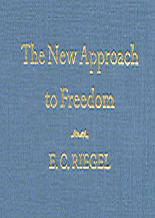 Home Page
Home Page Open PDF Version
Open PDF Version Purchase Hardcopy
Purchase Hardcopy
 THE NEW APPROACH TO FREEDOM
THE NEW APPROACH TO FREEDOMTogether with Essays on the Seperation of Money and State by E. C. Riegel Edited by Spencer Heath MacCallum THE HEATHER FOUNDATION
Copyright © 2003 The Heather Foundation |
||||||||||||||||||||
|
||||||||||||||||||||
|
PEOPLE everywhere associate revolution in the twentieth century with the dramatic events that occurred in Russia during World War I. But there occurred a still greater revolution of which most people are unaware. This was a revolution more gradual, more subtle, and more far-reaching in its consequences. It was a revolution in government fiscal policy, which not only has underwritten the socialist developments in this century by the revenues it has provided the state, but has further promoted these developments through the debilitation and demoralization of personal enterprise that has followed. The power of any government to make paternalism seem practical, and thus insidiously to socialize the economy, lies entirely in the belief that it can and does issue money. This is the foundation error from which all socialistic projects receive their unsuspected sustenance. To attribute to government the power to issue money, makes of it an apparent fountain of wealth that strikes the ground from under all opposition to the welfare state. If government has the power to issue real money, what can possibly be wrong with paternalism and the socialistic ideology? The practice of deficit financing seductively turns the minds of the people from the economic means of attainment to the political. For, obviously, when government can continuously take out without putting in, it strengthens itself and commensurately weakens personal enterprise, with the result that the people develop a growing respect for and dependence upon government and a contempt for enervated personal enterprise. This conditions them for progressive socialization and dictatorship. The secret of this process lies overwhelmingly in the Government's power to dilute the money stream. Ideologies have little to do with it; they are an accompaniment more than a cause. This revolutionary shift in government finance has come about, in the United States, since 1931. Here is the historic record of war deficit financing and of subsequent debt reduction:
It is evident that the Government's traditional practice was to run deficits under the stress of war and to reduce them during the succeeding peace. Government money issue power was therefore curbed by fiscal policy. The creation of money was normally the function of private businessmen, and the banking system remained largely the servant of personal enterprise. In the depression year of 1931, however, peacetime deficits were instituted for the first time. Soon thereafter, the policy was adopted of treating the depression as a war and ameliorating it by public borrowing and lending and spending. These deficits, greatly expanded during World War II, have become an established habit that constitutes a veritable politico-economic revolution. Credit is now controlled by the Government, the banks are but branches of the Treasury, and deficit financing is established policy. Such a policy by a government is, in all innocence, the beginning of a process which culminates in communism, which is but the receiver for bankrupted personal enterprise. By issuing monetary units, government acquires the people's labor and substance, and gives them nothing in return. Simultaneously, exchange, upon which personal enterprise depends, is destabilized, and by this sabotaging process the people, in desperation, are finally compelled to petition the government to go into the production and distribution of the necessities of life. In other words, the process of issuing monetary units, without giving anything in exchange for them, ultimately brings a public demand that the government return something for its issue. With this, the people petition themselves into communism. For when government enters production and distribution, free exchange and, therewith, all freedom, ends. Lenin reputedly said, "the surest way to overturn the social order is to debauch the currency." Certainly a major instrument of the Bolshevik revolution was the extensive counterfeiting of the Czar's currency with this objective in mind. This deliberate policy is memorialized in the following curious passage translated from the Russian:
Money, the hated device of capitalism, was found, however, to be indispensable to progress, and since the revolution, the dictators of Russia have been trying to restore this instrument of the social order. Thus they have been forced into the position of trying to regain the principal instrument of capitalism—without too obviously retreating from their ideology. In frustration they have turned to robbing their neighbors under the pretense of “liberation” and “democracy.” The non-communist governments, while innocent of any intent to destroy their monetary systems, are nonetheless proceeding by gradual steps to attain the same ends that the communists did by plan—and the means of accomplishment is the same, namely, counterfeiting, albeit of the legalized variety. Thus are the non-communist governments proceeding blindly toward collapse. The communist governments, for their part, are striving to avert collapse by desperate attempts to steal that which the former in their ignorance are sabotaging. Hence the capitalism vs. communism confrontation is false. It is a fog obscuring the real issue, which is fiscal policy. The real issue is between counterfeit and genuine money. Socialization, which now threatens every nation in the world and is really unwanted in every nation, is being forced upon every people and every government as the result of deficit financing, which is the Lorelei of the do-gooder politician. She promises relief to the distressed without cost to anyone. This illusion, once accepted, requires more courage to renounce than the politician can muster, and thus the ship of state is led to the rocks. I see no escape but for the people to declare the separation of money and state, and thus forever end unbalanced budgets with their impulsion to socialization and interference with personal rights. |
||||||||||||||||||||